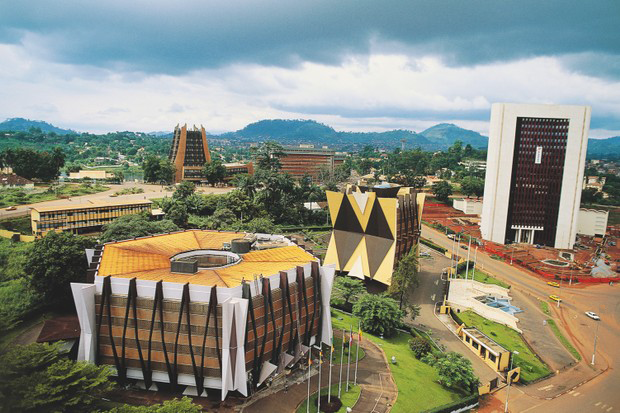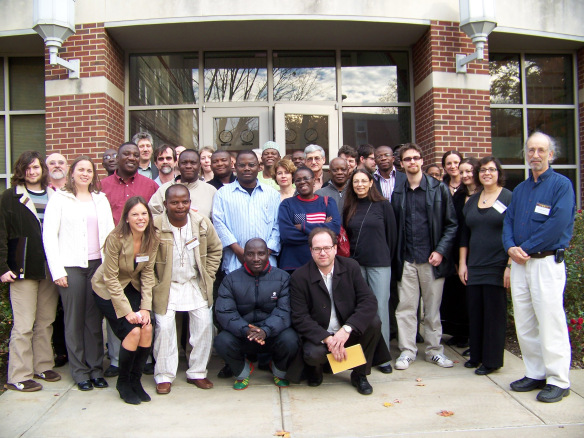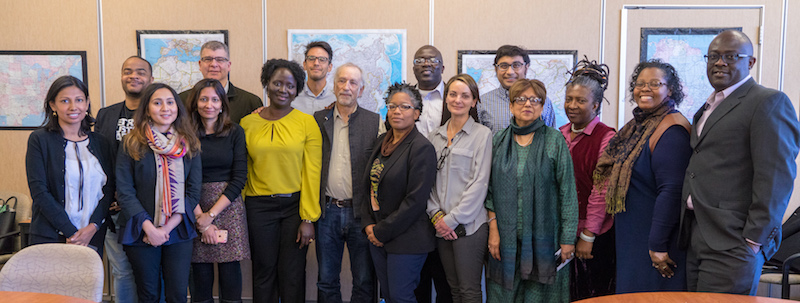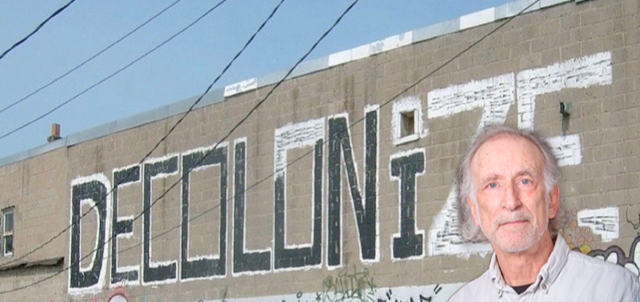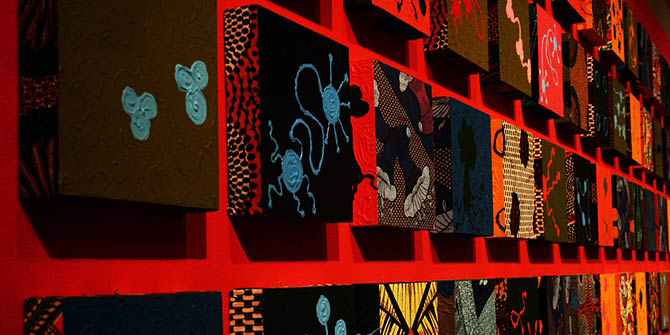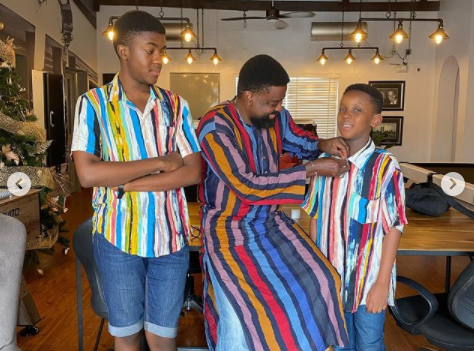THE TOYIN FALOLA INTERVIEWS: A CONVERSATION WITH KEN HARROW, PART 4 of 5
Toyin Falola

A CONVERSATION WITH
PROFESSOR KENNETH HARROW

PART 4 OF 5:
DECOLONIALITY: A CASE FOR RADICALISM
Biography
Born 1920, in Salt Lake, Utah, Kenneth Harrow obtained a Bachelor of Science at Massachusetts Institute of Technology (MIT) in 1964, a Masters of Arts in English at New York University (NYU) in 1965, and a Ph. D. in Comparative Literature in 1970. He began his teaching career at Michigan State University (MSU) in 1966, becoming a full Professor in 1989. His areas of focus include African cinemas, African literature, and Postcolonial studies. In the period between when he commenced his teaching career and his appointment as a professor (1966-1989), Kenneth Harrow completed multiple terms in Paris, London, Mexico, Cameroon, and Dakar.
He taught at the University of Yaoundé, Cameroon (1977-1979), which was repeated at the Department of English, Cheikh Anta Diop University in Dakar, Senegal, in various capacities in the 1980s; again in 1989, and also from 2005 to 2006. During his other visits to Africa, Professor Kenneth Harrow delivered lectures at several African universities, from Dakar in Senegal to Yaoundé in Cameroon and Ouagadougou in Burkina Faso.
In the United States, Kenneth Harrow was at the Department of Literature, University of California, San Diego, in 1989. He served in a different administrative capacity at MSU; in 2000-2002, he was the Director of Graduate Program in Comparative Literature; and in 2011-2015, he was the Faculty Excellence Advocate. He has also convened and or organized several conferences at MSU (notably the 1986 and 1997 African Literature Association Conferences).
His scholarly publications cover edited works, over forty journal articles, and more than half that number of book chapters. Some of his single-authored books include Threshold of Change in African Literature: The Emergence of a Tradition (1994); Less than One and Double: A Feminist Reading of African Women’s Writing (2002); Postcolonial African Cinema: From Political Engagement to Postmodernism (2007); and Trash! African Cinema from Below (2013). He is the African Film Editor for African Studies Review, the General Editor of African Humanities and Art Series of Michigan University Press, and an editorial board member of Research in African Literature. He was a member, Vice President, and President of the Executive Council of African Literature Association (1981-1989); Member, the Executive Board of the African Studies Association (1997-200). His work outside academia was as a Member of the United States Coordinating Committee of the Amnesty International for Central Africa, where he was a coordinator for Burundi, Rwanda, and Congo DRC.
He has received various honors and recognitions, most notably the Distinguished Member Award (2009) from The African Literature Association; the Paul Varg Alumni Award (2010) for Faculty and Distinguished Faculty Award from Michigan State University; the Distinguished Africanist Award (2011) from the University of Texas at Austin; and the African Studies Association Public Service Award.
PART A:
THE INTERVIEW

Photo: Professor Kenneth Harrow with colleagues and former students at Michigan State University, 2018
Toyin Falola:
11. You have witnessed diverse perspectives, cultures, histories, and affiliations. Do you have any particular memory or an unforgettable moment?
Kenneth Harrow:
It's actually little moments that spring to mind. Trying to cross the border, in a long road trip, in 1978, from Benin to Togo, being told to wait aside by the guard, at a time when the govt in Benin called itself communist and appeared very hostile at the border. A worse experience in Algeria, in 1975, trying to board a ship to return to France, and being fined for lacking a permission to drive. Algerian guards hassling us; but Moroccans welcoming us. Love and fear. Love going into the markets in Grand Messa in Yaounde every day, getting to know the market women, and, the pain in having to leave them after two years. Being at home there, being at home on the campus, especially with the DEA grad students in Dakar, but feeling the threat from students during the strike where no teachers were to come to campus. The ties to those grad students were very strong. Deepest of my ties being to Emmanuel Yewah from Yaounde in 1978-79, who subsequently came to the U.S. and is now a prof at Albion College. And a similarly deep tie to my former Senegalese grad student Emilie Diouf, now a prof at Brandeis University. A vast student strike in Dakar, taking over the main road, and me walking home through the crowd, feeling the energy and violence surrounding me. A souvenir, a tear gas cannister, sits upstairs in my study. I taught a good class in Dakar, my first-time teaching there around 1989, and at the end the students applauded. I felt I had done the right thing. But if I really want to imagine the moments to remember, it will be sitting in a café with my wife, or sitting at an outdoor hole in the wall restaurant in Nigeria with you, Toyin, having a pepper soup and beer, and just enjoying the life of being there. I can't say how many times walking the streets in the quartier, like the Medina in Dakar, was enough, was more than enough. You can't quite say what the buildings were like, what the people said and did; but it was enough. That was the best!
Toyin Falola:
- How is the post-retirement life?
Kenneth Harrow:
It was difficult at first not to have students and classes, except for the grad students I continue to work with. Very hard to read a book or watch a film, think this would be great to teach, and then realize never again would I teach that great film. But I found a rhythm of work, of reading and working on my current research project, which gives me a sense of purpose. Plus, until covid, I had a good number of talks to give, conferences to attend, etc., all of which either ended or went to zoom. I am used to that. And my personal life has changed so that I now spend a good deal more time, even just on line, with my grandkids, four of whom are five or under. Reading to them, playing games with them, usually about an hour or so a day, becomes a good chunk. The work with my university, on the other hand, has mostly ended.
Toyin Falola:
- Any impact of COVID-19?
Kenneth Harrow:
I had planned on retiring in two years, but COVID-19 and the new virtual world may mean that the academy should be reorganized. Is tenure and other current policies needed for the academy to function? Is the right of free speech that gave birth to tenure not anachronistic in the age of social media where any one can stay in the small corner of his office in a bush and abuse people? The changes at MSU are the opposite. Strong, open, vocal activism drives the department's actions and policies, and the active faculty are anything but hidden behind bushes. Radical changes in curriculum and direction have led to a certain degree of intolerance, or so it seems from a distance. I struggle between pushing a progressive agenda, but against identity politics and cancel cultures that seem not open to debate.
Toyin Falola:
- As a literary critic and scholar on comparative literature, what is your view on literary and cultural texts about refugee crisis and how valuable are they to 21st century Literature in English?
Kenneth Harrow:
For a while I brought into my teaching works like Fatou Diome's Belly of the Atlantic, and films like Traore's La Pirogue—especially concerned with stories, many stories, about Africans trying to cross the Mediterranean and risking or finding death in the process. I focused on France when it came to the metropole, as I know it best and it is a major destination. Another really powerful text is Manthia Diawara's magnificent Opera of This World, again about the refugee crisis. And many films set in Europe, about refugees. I feel this is the crisis of our times. Immigration and race in the States gave us a demagogue. The same issues, with different races—Arabs in France, Turks in Germany, Syrians now in much of Europe, Iraqis after their wars, and all those who fled through Libya, the Eritreans, the Afghanis and so on, across Europe—all have tested the moral compass of the wealthy nations. Some were stingy, like Macron in France. Some opened their borders, like Merkel in German. Some quit Europe altogether, like Johnson in the U.K. And some flirted with fascism, using the immigrants as their campaign issue, like Trump. To avoid the racism and xenophobia this entails is to ignore the central crime of our times, and there is no shortage of fiction and film to use in teaching about this.
Toyin Falola
- What is your view on the decolonization in universities and the idea that African knowledge should be at the center?
Kenneth Harrow:
If you mean in African universities, it is long overdue. If you mean in universities outside Africa, I don't quite get the question. If you mean in black studies departments in the U.S., they have been Afrocentric since their inception. But the larger question turns on how we understand the term Afrocentric. I reject the Temple University older fashioned use of the term, with Egypt providing the point of origin for the African identity. My own predilection is for thinkers like Stuart Hall or Edouard Glissant, or as I mentioned often, Gikandi or Diawara, who find diaspora studies enriched by the powerful intellectual traditions that have been creolized or hybridized or multisystemic. Not -centric as such. But if you stand on the leg of mixing, the other leg says, you can't understand anything that is Africa from a distance. That the perspective that requires seeing without distortion relies on being on the ground, looking from the place of those whose world is one about which you write.
On the other hand, texts are not simply realistic transmissions of external realities, but constructions and creations like ourselves, not simply fixed models. And we go back and forth swearing, on the one hand, Esu's hat was black, and on the other, it was red, while it was never something you could ever see all together at any time. To return to your question, decolonization: it is, like the question about refugees, the question for our times. I take seriously the work of the Comaroffs in placing direct blame for the exploited and dominated order of our times on the powers that control the globalized economies, the neoliberal globalization that touches all our lives, as Akin Adosekan so well described in his book Postcolonial Artists and Global Aesthetics. It is a call for arms, but not for decolonization in the old-fashioned sense in which a neocolonial order prevails. Simply consider the mineral extraction issue in the East Congo, where millions died in the fighting, and where a shifting pattern of outside countries, from Malaysia to China to East Europe to Israel, all grabbed whatever coltan or diamonds, etc. they could, and enabled the arming of disparate militias to destroy the social order and lives of many millions of people. That "decolonization" is part and parcel of the crisis over displaced persons and refugees, and we have to address it to our uninformed students.
PART B
INTERVIEW ANALYSIS AND REFLECTIONS BY TOYIN FALOLA
DECOLONIALITY: A CASE FOR RADICALISM

Photo: Professor Harrow with other participants at a conference on “African Film,”convened by Mahir Şaul and Ralph Austen, University of Illinois, Urbana-Champaign, November 2007.
The modern perspective of life is primarily based on the assumption of binary opposition. Ferdinand de Saussure, who is regarded as the father of structuralism, articulated this view in his teachings on structuralism in the early 20th century. This has become a widely accepted view, even in the African parlance. However, the African worldview had always assumed the binary nature of life, judging by the makeup of the Yoruba people’s odu ifa. Therefore, it will be wrong to admit loosely that Saussure’s exposition marks the foundation of Africa’s binary awareness.
Having stated the above, the reality of binary opposition in postcolonial Africa is too noticeable to be ignored. Indeed, life occurs with its highs and lows, ups and downs, and other extreme ends that humans are subjected to, willingly or not. But as said earlier, it is a peculiar case in postcolonial Africa because of the previous activities of colonial masters in this territory. Scholars have labeled it a state of postcolonial disillusionment because the African people desired and worked towards an independent community with the assurance of freedom and self-governance but were only faced with a life of corruptible leadership, turmoil, and decadence. The reality that materializes after independence is nothing near what the people expected. Sadly, many African countries are still stuck in the mud of crisis and violence, even after independence.
Internal violence has become a major component of most African countries. There is hardly a nation in Africa that is not fraught with one form of crisis or inter-ethnic war or the other. Going as far back as the early post-independence era, Algeria broke out into an internal war that made the country unsafe for its citizens. This is a crisis that festered into the late 20th century. There is no question of whether foreigners (including natives of other African countries) feel safe in a country where even its citizens have no trace of being safe. A similar situation occurred in some West African countries like Nigeria that broke out into a civil war barely six years after independence. The war witnessed the massacre of over a million Nigerians, especially those from the eastern part of the country. Again, if the country was barely safe for its citizens, foreigners needed extra caution to move about.
Perhaps in the dark and violence-ridden continent of Africa, the silver lining is the Africans’ ability to (re)create joy in the face of chaos. This is a widespread phenomenon among Africans; it is a little wonder that a 2012 poll showed that Africans are the most optimistic people on earth. This explains how Africans can laugh amidst crises and celebrate with bullets flying over their heads. Yamina Bachir’s 2002 movie, Rachida, showcases this with a scene dedicated to wining, dining, and dancing in a chaotic Algerian village. As expected, the celebration is cut short by the sound of guns and the commotion that ensued. Similarly, in the movie adaptation of Chimamanda Adichie’s Half of a Yellow Sun, a narrative of the Nigerian civil war, there is a scene of a marriage celebration in the middle of the war. Also, as expected, a bomb blast signals an end to the party.
This also brings to fore the place of family in an African setting. Despite globalization and civilization that has led to a significant interaction of cultures worldwide, even without being physically involved, the postcolonial African “native” has kept alive the remnants of his/her culture. Part of the culture includes the concepts of family and togetherness. The African does not regard himself as self-sufficient but as part of a whole, which is the whole essence of the Ubuntu philosophy, “I am because we are.” Back to binaries, this philosophy opposes the Western belief that “I am because I think.” However, all over the world, family is respected and sacrosanct, as the African also believes. There is hardly a work of art—literature, film, painting—that carries the African burden and sensibilities without portraying the deep sense of “familiality” in the work’s cultural context. From Achebe’s Things Fall Apart to Adichie’s Americanah, the family is held in high esteem. The same is true of African films.
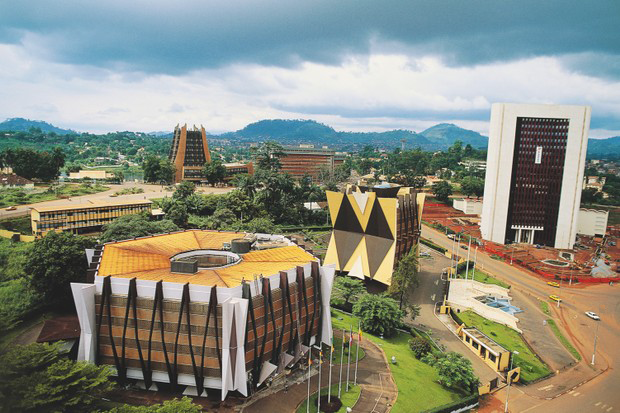
Photo: Yaoundé, the capital of Cameroon
Africans’ ability to find joy and reasons for celebration in war and crisis, especially with family and friends around, is a pointer to the resilient spirit that they embody. Indeed, it has to be a different kind of resilience because, considering the state of living in Africa, it should be a continent devoid of a drop of happiness. The majority of the most-neglected crisis zones in the world are claimed to be in Africa. This same continent is home to 94% of the world’s malaria cases. Some years ago, it became home to the deadly disease, Ebola; just as a handful of people are still carriers of HIV/AIDS to date. All of these symbolize the unfortunate state of most African countries. The irony is that Africa is the least hit of the most recent global pandemic—COVID-19. The pandemic, which has held the whole world in a standstill for over a year, has killed many more people in so-called “developed continents” than in Africa. This is a thing of concern for the western world. However, the downside to this for Africa is the effects of the pandemic on the continent’s fragile economy. The pandemic that broke out in China in late 2019 has redefined how people worldwide relate to one another and the things around them.
Since most African countries are struggling compared to some other countries globally, the continent seems to be taking more blows as far as the adverse effects of COVID-19 are concerned. Unfortunately, the coronavirus has also hurt most countries’ educational systems in the continent. While more advanced economies have switched to electronic learning, some African countries cannot do this due to a lack of infrastructure. Hence, learners in this part of the world lag behind their counterparts in other places where electronic learning has been embraced. By implication, teachers/lecturers and students alike are subjected to a compulsory break from learning. This should be a thing of concern for policymakers in most African countries, especially where decolonization is concerned.
While this is the fate of Africans who live on the continent, a different and not-so-friendly fate is obtainable for Africans and even Blacks outside of the continent. The Black (wo)man faces the harsh reality of racism and the refugee crisis in a foreign land. It is as though being black-skinned exposes such person(s) to the most virulent treatment from other humans. A case in point is the most recent injustice experienced by a Black man, and by extension, the Black community in 2020. George Floyd was harassed by a white police officer who placed a knee on Floyd’s neck, suffocating him until he died. This reignited the Black Lives Matter movement, bringing back to public consciousness that Black life has not exactly received fair treatment from the white supremacist community in the US and from some government policies.
The situation of George Floyd’s brutal treatment and eventual death did not only resonate with Black people who experience first-hand racist treatment in the US, but also with every black person on earth, as evidenced by the solidarity support that the Blacks in the US received from other parts of the world. As stated earlier, neither the Blacks in the diaspora nor those at home—Africa—can claim fairness regarding life’s dealings. Sadly, these experiences are traceable to colonization in Africa and the transatlantic slave trade that illegally transported Africans away from their homestead to foreign shores. However, the Black community cannot continue to live in the shadows of its colonial masters.
The first step towards discontinuing living in the shadows of the colonial masters is decolonizing the knowledge space, that is, decolonization in universities. Under the guise of exposing Africans to modern education and western religion, the colonizers manipulated Africans into accepting that whatever comes from Africa is inferior to that of the West. In other words, the West’s tactics were not just to dominate Africans physically, but also to break their mind and soul, only as done to those taken during slavery. The missionaries introduced western education, which although invariably gave Africans access to better opportunities in the modern world, continued to push them away from their African root.
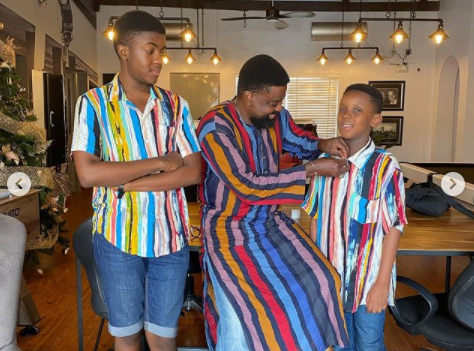
Photo: Kunle Afolayan, popular Nigerian Actor, posing with his children, January 2021
For instance, Ngugi narrates his experience as a boy in a village in Kenya. He explains how the missionaries and colonial lords masterfully replaced the rich African culture he was born and bred into with their own superimposed culture. Hence, for Ngugi wa Thiong’o, Obi Wali, and some other intellectuals, decolonizing the African knowledge space starts from the rejection of the colonizer’s languages. For these people, using the colonizer’s language, also regarded as the relativist’s approach to language, means the people are still mentally enslaved by their former colonizers despite being physically free. Sadly, physical freedom is not enough if the people’s minds are still controlled by colonial knowledge. While it is possible to debate that the enlightened African mind is not controlled by colonial/western knowledge, one wonders why many Africans think that the African knowledge system is inferior to that of the West.
Ngugi and similar minds argue that African writers must be willing to write in African languages because, that way, they can genuinely convey African life’s burden and sensibilities. However, maybe the argument should be made more for what is being taught in African universities than how it is being taught. To a very commendable extent, African universities have embraced African knowledge and epistemology. In most humanities departments in African universities, the focus has shifted from teaching western knowledge to Africans. The same is true of diaspora departments in other parts of the world that focus on Black studies. But as far as decolonization, which puts Africa at the center of world discussion and situates the continent as a strong contender where other world power is concerned, there is a need for more than teaching African knowledge in African universities. There is an urgent need for African countries to take an aggressive hold against global powers that control world economies. This need for an aggressive takeover becomes imperative when one considers an African region like East Congo. This area has suffered from the exploitation of other countries of the world—countries like China, Israel, and Malaysia continue to benefit from mineral resources abound in the Congo without concern for the civil unrest in the country. They even sponsor local militias to ferment war and disorder in the country further.
This kind of situation is not peculiar to the Congo. Sadly, there is a similar case or the other in most African countries. In Nigeria, the terrorist group, Boko Haram, has festered for years. The question that remains unanswered is how this group is being funded. Thousands of deaths linked to Boko Haram terrorists have been recorded in the Northeastern part of Nigeria. Yet, there seems to be no end in sight to the menace that is ravaging the country. The Republic of the Niger also suffers the same fate of unrest from the terrorist Boko Haram group along with food shortage caused by bad harvests.
One can continue to list more African countries that are disturbed by internal crises and from which the western world and other vested countries benefit. Therefore, as the Yoruba-speaking people of western Nigeria would say, it takes more than physical eyes to break open the palm kernel. It requires some radicalism to achieve all-around decolonization in Africa and place the continent at the center of world order. Young African students must be taught about the possibilities of radical politics and activism.
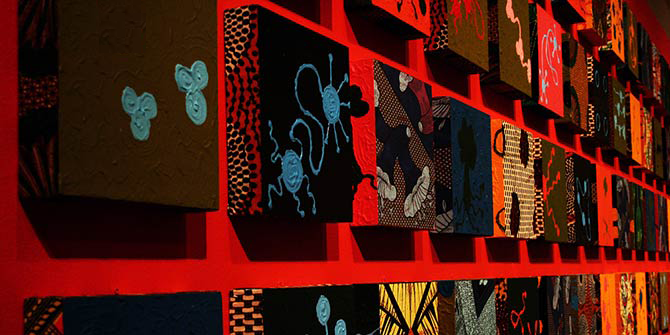
Photo: African art at the Metropolitan Museum of Art in New York City
Toyin Falola

A CONVERSATION WITH
PROFESSOR KENNETH HARROW
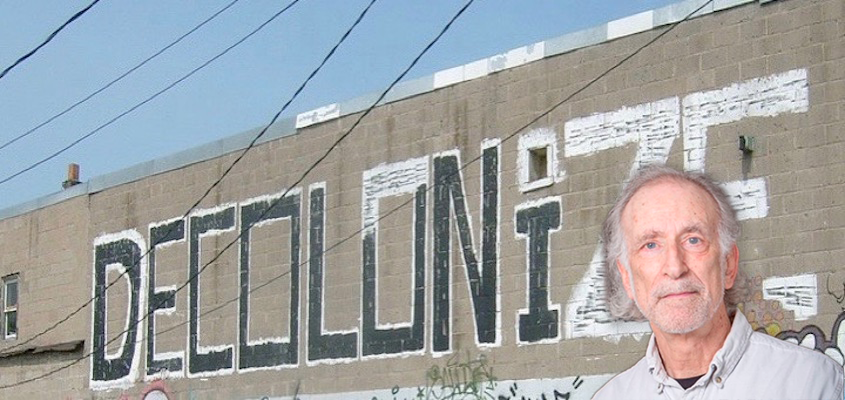
PART 4 OF 5:
DECOLONIALITY: A CASE FOR RADICALISM
Biography
Born 1943, in Yonkers, New York, Kenneth Harrow obtained a Bachelor of Science at Massachusetts Institute of Technology (MIT) in 1964, a Masters of Arts in English at New York University (NYU) in 1965, and a Ph. D. in Comparative Literature in 1970. He began his teaching career at Michigan State University (MSU) in 1966, becoming a full Professor in 1989. His areas of focus include African cinemas, African literature, and Postcolonial studies. In the period between when he commenced his teaching career and his appointment as a professor (1966-1989), Kenneth Harrow completed multiple terms in Paris, London, Mexico, Cameroon, and Dakar.
Gloria Emeagwali
On Feb 24, 2021, at 13:33, Toyin Falola <toyin...@austin.utexas.edu> wrote:
--
Listserv moderated by Toyin Falola, University of Texas at Austin
To post to this group, send an email to USAAfric...@googlegroups.com
To subscribe to this group, send an email to USAAfricaDial...@googlegroups.com
Current archives at http://groups.google.com/group/USAAfricaDialogue
Early archives at http://www.utexas.edu/conferences/africa/ads/index.html
---
You received this message because you are subscribed to the Google Groups "USA Africa Dialogue Series" group.
To unsubscribe from this group and stop receiving emails from it, send an email to usaafricadialo...@googlegroups.com.
To view this discussion on the web visit https://groups.google.com/d/msgid/usaafricadialogue/PH0PR06MB72383436E9E52BE278BAA71FF89F9%40PH0PR06MB7238.namprd06.prod.outlook.com.
Biko Agozino
OLAYINKA AGBETUYI
Listserv moderated by Toyin Falola, University of Texas at Austin
To post to this group, send an email to USAAfric...@googlegroups.com
To subscribe to this group, send an email to USAAfricaDial...@googlegroups.com
Current archives at http://groups.google.com/group/USAAfricaDialogue
Early archives at http://www.utexas.edu/conferences/africa/ads/index.html
---
You received this message because you are subscribed to the Google Groups "USA Africa Dialogue Series" group.
To unsubscribe from this group and stop receiving emails from it, send an email to usaafricadialo...@googlegroups.com.
Gloria Emeagwali
On Mar 1, 2021, at 06:05, 'Biko Agozino' via USA Africa Dialogue Series <usaafric...@googlegroups.com> wrote:
To view this discussion on the web visit https://groups.google.com/d/msgid/usaafricadialogue/298837535.1309021.1614550853629%40mail.yahoo.com.
Harrow, Kenneth
kenneth harrow
professor emeritus
dept of english
michigan state university
Sent: Monday, March 1, 2021 12:01 PM
To: usaafric...@googlegroups.com <usaafric...@googlegroups.com>
Subject: Re: USA Africa Dialogue Series - THE TOYIN FALOLA INTERVIEWS: A CONVERSATION WITH KEN HARROW, PART 4 of 5
Biko Agozino
Cornelius Hamelberg
Dear Professor extraordinaire,
It looks like we’ve got to not only de-colonise but also de-tribalize? The latter could prove to be more difficult than the former. Just ask anybody...
Re – the Impertinence of Black Privilege of a Johnny come lately, Black African immigrant Professor “telling Americans which white scholars they should be reading and which to ignore as a matter of personal taste or likes.” This is so funny that I’ve been laughing since this morning (Central European time)
Concerning what’s yours and what's mine compare and contrast these two :
Ambrose Adekoya Campbell – London Is The Place For Me
and
Cornelius Hamelberg
In this thread let’s begin by correcting a gross typographical error. Kenneth Harrow wasn’t born in 1920, as stated in the introduction to this interview, an obvious oversight by one of Africa’s greatest historians who since he is great friends with Professor Harrow knows that Professor Harrow is not even yet an octogenarian. B'ezrat HaShem, when that day comes, it’s Mazal Tov, celebration time, cheers, Auld Lang Syne, for he’s a jolly good fellow – and so say all of us!
Biko, secondly, Professor Harrow never claimed to be an expert on your continent. And who told you that my continent belongs to you anyway? All that we’ve heard Professor Harrow say in his own words is that he is a specialist in certain areas - certain interesting areas, c’mon , after all his doctoral thesis was on “The transformation of the rebel : a comparative study of the works and development of Albert Camus, Arthur Miller, and Ignazio Silone” – Camus - (just in case you are interested in so called “identity politics” what was Camus’ position on the Algerian War of Independence – just as I’m interested in Achebe and Okigbo’s and maybe – if relevant even Molefi Asante’s position on Biafra
I think that I had better leave it at that….
Emeagwali, Gloria (History)
Prof. of History/African Studies, CCSU
africahistory.net; vimeo.com/ gloriaemeagwali
Recipient of the 2014 Distinguished Research
Excellence Award, Univ. of Texas at Austin;
2019 Distinguished Africanist Award
New York African Studies Association
Sent: Monday, March 1, 2021 2:14 PM
To: usaafric...@googlegroups.com <usaafric...@googlegroups.com>
Subject: Re: USA Africa Dialogue Series - THE TOYIN FALOLA INTERVIEWS: A CONVERSATION WITH KEN HARROW, PART 4 of 5
Please be cautious: **External Email**
Emeagwali, Gloria (History)
OLAYINKA AGBETUYI
Listserv moderated by Toyin Falola, University of Texas at Austin
To post to this group, send an email to USAAfric...@googlegroups.com
To subscribe to this group, send an email to USAAfricaDial...@googlegroups.com
Current archives at http://groups.google.com/group/USAAfricaDialogue
Early archives at http://www.utexas.edu/conferences/africa/ads/index.html
---
You received this message because you are subscribed to the Google Groups "USA Africa Dialogue Series" group.
To unsubscribe from this group and stop receiving emails from it, send an email to usaafricadialo...@googlegroups.com.
Harrow, Kenneth
kenneth harrow
professor emeritus
dept of english
michigan state university
Sent: Tuesday, March 2, 2021 9:53 PM
To: usaafric...@googlegroups.com <usaafric...@googlegroups.com>; Harrow, Kenneth <har...@msu.edu>
Subject: RE: USA Africa Dialogue Series - THE TOYIN FALOLA INTERVIEWS: ACONVERSATION WITH KEN HARROW, PART 4 of 5
OLAYINKA AGBETUYI
Listserv moderated by Toyin Falola, University of Texas at Austin
To post to this group, send an email to USAAfric...@googlegroups.com
To subscribe to this group, send an email to USAAfricaDial...@googlegroups.com
Current archives at http://groups.google.com/group/USAAfricaDialogue
Early archives at http://www.utexas.edu/conferences/africa/ads/index.html
---
You received this message because you are subscribed to the Google Groups "USA Africa Dialogue Series" group.
To unsubscribe from this group and stop receiving emails from it, send an email to usaafricadialo...@googlegroups.com.
Cornelius Hamelberg
A-mended
Back to the anecdotal and away from high seriousness.
Biko’s argument hinges on colour – that Professor Harrow is a “White Man”
If Professor Harrow had been a Black Man and had written the same books and said exactly the same words would Biko have been harassing a Black Harrow, in this mostly “Black” Forum?
We have been here before - the classic explosion between Valentine Ojo and Brother Harrow, precisely on this issue: this was the palaver and this was my plea. What we have to avoid is the indecent descent into racism, colour prejudice, xenophobia, parochialism and academic bigotry.
“The world of learning is one house” is the Chinese proverb that our English Teacher A. T. von S. Bradshaw used to write on the blackboard (Something for Lord Agbetuyi: A list of Yoruba words in Krio...) Kwame Anthony Appiah also makes the point in his “In My Father’s House”, that thought itself does not have a colour. That too is debatable.
For a short while (in 1970 at the Institute of African Studies, Legon, Ghana)) I was a “language informant” to the then visiting Professor Jack Berry arguably/unarguably the number one expert on Sierra Leone Creole / Krio phonetics. At our last meeting he accused me of “language interference” because I differentiated and still differentiate between the Sierra Leone Creole/ Krio pronunciation of George (like King George) and Judge (such as a supreme court judge or the verb to judge). In the Creole that I speak there is no difference whatsoever and we adhere to the RP British pronunciations or George and Judge. He maintained that to the seasoned Sierra Leone Creole speaker there is no difference in pronunciation. I told him that to this seasoned speaker (yours truly) there is. Of course there are other speakers of that language and a tremendous variation / variety in their pronunciation which I marvel at when I read various transliterations. e.g. “ unu” instead of “una”( Wolof speakers have their own troubles with sibilants e.g. saying scissors, church ; among some some Sierra Leone natives speakers Sierra Leone is pronounced “Shierra Leone” (This is what colonialism has done to us
I didn’t think “this White Man “(Professor Jack Berry) “thinks that he knows my own language/ Mother Tongue better then me” – instead I thought “another ignoramus a-toh-toh pontificating..,” the point being that his point of view/ knowledge is not based on the colour of his skin. In my Sierra Leone, back then there was Nuni a Russian guy who together with his brother ran “Cape Club” at Lumley Beach – and also a monkey zoo at Kingtom from where they exported monkeys to Europe. He spoke good Creole/ Krio as did an Iranian diplomat Kamal Vandi,who had served in Sierra Leone briefly ( after the Islamic Revolution in Iran) he got me to almost jump out of my skin. He happened to be sitting next to me at the cinema, turned to me and started talking to me in perfect Creole/ Krio, so I temporarily jumped out of my skin but returned back in, thinking that he must be another Lebanese like Nabih Berri, born and bred there - but know he had learned the language just like the Peace Corps volunteers during the JF Kennedy years…
Afrocentrists make a special point that Pushkin the great fertiliser of Russian prose was Black; on the strength of his “dark lady”, Afrocentrists are pushing the theory that Shakespeare was dark. Of course, the Jews wanna claim him too
You received this message because you are subscribed to a topic in the Google Groups "USA Africa Dialogue Series" group.
To unsubscribe from this topic, visit https://groups.google.com/d/topic/usaafricadialogue/cF0XFXU-adk/unsubscribe.
To unsubscribe from this group and all its topics, send an email to usaafricadialo...@googlegroups.com.
To view this discussion on the web visit https://groups.google.com/d/msgid/usaafricadialogue/DB6PR04MB2982E98535E49B276C8068E8A6989%40DB6PR04MB2982.eurprd04.prod.outlook.com.
Cornelius Hamelberg
Corrected (please discard earlier posting)
Back to the anecdotal and away from high seriousness.
Biko’s argument hinges on colour – that Professor Harrow is a “White Man”
If Professor Harrow had been a Black Man and had written the same books and said exactly the same words would Biko have been harassing a Black Harrow, in this mostly “Black” Forum?
We have been here before - the classic explosion between Valentine Ojo and Brother Harrow, precisely on this issue: this was the palaver and this was my plea. What we have to avoid is the indecent descent into racism, colour prejudice, xenophobia, parochialism and academic bigotry.
“The world of learning is one house” is the Chinese proverb that our English Teacher A. T. von S. Bradshaw used to write on the blackboard (Something for Lord Agbetuyi: A list of Yoruba words in Krio...) Kwame Anthony Appiah also makes the point in his “In My Father’s House”, that thought itself does not have a colour. That too is debatable.
For a short while (in 1970 at the Institute of African Studies, Legon, Ghana)) I was a “language informant” to the then visiting Professor Jack Berry arguably/unarguably the number one expert on Sierra Leone Creole / Krio phonetics. At our last meeting he accused me of “language interference” because I differentiated and still differentiate between the Sierra Leone Creole/ Krio pronunciation of George (like King George) and Judge (such as a supreme court judge or the verb to judge). In the Creole that I speak there is a difference, because in this instance we adhere very closely to the RP British pronunciations of George and Judge. He maintained that to the seasoned Sierra Leone Creole speaker there is no difference in pronunciation. I told him that to this seasoned speaker (yours truly) there is. Standard Creole / Krio pronunciation. Of course there are other speakers of that language and a tremendous variation / variety in their pronunciation which I marvel at when I read various transliterations. e.g. “ unu” instead of “una”, “wuna” instead of “una”. ( Wolof speakers have their own troubles with sibilants e.g. saying scissors, church ; among some some Sierra Leone natives speakers Sierra Leone is pronounced “Shierra Leone” (This is what colonialism has done to us. There are even Anglo-Sierra Leone Creole pronunciations ( enough to make you smile, or shmile….
I didn’t think “this White Man “(Professor Jack Berry) “thinks that he knows my own language/ Mother Tongue better then me” – instead I thought “another ignoramus a-toh-toh pontificating..,” the point being that his point of view/ knowledge is not based on the colour of his skin. In my Sierra Leone, back then there was Nuni a Russian guy who together with his brother ran “Cape Club” at Lumley Beach – and also a monkey zoo at Kingtom from where they exported monkeys to Europe. He spoke good Creole/ Krio as did an Iranian diplomat Kamal Vandi,who had served in Sierra Leone briefly ( after the Islamic Revolution in Iran) he got me to almost jump out of my skin. He happened to be sitting next to me at the cinema, turned to me and started talking to me in perfect Creole/ Krio, so I temporarily jumped out of my skin but returned back in, thinking that he must be another Lebanese like Nabih Berri, born and bred there - but know he had learned the language just like the Peace Corps volunteers during the JF Kennedy years…
Afrocentrists make a special point that Pushkin the great fertiliser of Russian prose was Black; on the strength of his “dark lady”, Afrocentrists are pushing the theory that Shakespeare was dark. Of course, the Jews wanna claim him too
You received this message because you are subscribed to a topic in the Google Groups "USA Africa Dialogue Series" group.
To unsubscribe from this topic, visit https://groups.google.com/d/topic/usaafricadialogue/cF0XFXU-adk/unsubscribe.
To unsubscribe from this group and all its topics, send an email to usaafricadialo...@googlegroups.com.
To view this discussion on the web visit https://groups.google.com/d/msgid/usaafricadialogue/DB6PR04MB2982E98535E49B276C8068E8A6989%40DB6PR04MB2982.eurprd04.prod.outlook.com.


